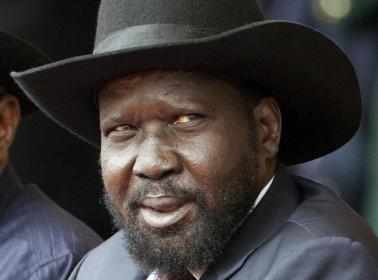Opposition PLP says extension of Kiir’s term a declaration of war
March 27, 2015 (TONJ) – A South Sudanese opposition party, known as People’s Liberal Party (PLP), said the recent extension of term limit for president Salva Kiir and members of parliament was a declaration of war against the people of South Sudan.

“Extension of government lifetime is [a] declaration of war,” he said.
Majongdit, whose party is based in Warrap state, home to president Kiir, said he decision to self-legitimize and extend the president’s term in office for three more years was based on self-interest.
He argued that it was the people who gave the power to the elected members and the president and therefore the government should have gone back to the very people and ask them for additional mandate.
He challenged the members of parliament for passing the controversial amendments without first consulting with their respective constituencies which he said they claimed to represent.
“The legislation of the members of the parliament did not consult with the people from their own constituencies over the matter, so the decision was just taken by them to suit a particular interest which is the government interest and the people who elect them to those positions, their views were not heard and were not reflected,” he said.
He lamented that the public was unaware of the amendment of the constitution simply because their representatives in parliament failed to consult with them, adding this showed that the government was distancing itself from the public while making major decisions that will affect the citizens.
Majongdit further cited that when president Kiir addressed the public last week at John Garang’s mausoleum in Juba he never mentioned his plan to amend the constitution to extend his term in office, and to explain to the people why it was necessary.
“Right now leaving the peace efforts in the hands of IGAD and passing the security bill, and amendment of the constitution, that is a silent declaration of war meaning you don’t declare it publicly,” he said, while directing the statement to the president.
He declared that his political party (PLP) was opposed to the extension of the government’s term in office, saying this will jeopardize the ongoing peace process with the rebel faction of the Sudan Peoples’ Liberation Movement (SPLM-IO) led by former vice president Riek Machar.
The party chairman further said his observation clearly indicated that the people were not happy with the decision made to extend the president’s term in office and that of the legislature, saying it was time to speak out about it.
“We cannot keep quite because people want us to speak and that is actually, we are here to represent views of none other than the public and their needs and their demands.”
Other political parties in government including the main opposition faction of the SPLM-DC led by Lam Akol, voted against the amendment last Tuesday.
The SPLM-IO led by Machar also issued a press statement condemning the action by parliament, saying it was unconstitutional and would derail the peace process and encourage unnecessary intransigence on the part of the government.
The constitutional amendment also witnessed international rejection with the US envoy John Booth saying president Kiir government’s lifespan would only be extended through a peace agreement with the opposition factions.
Juba argues that the amendment was necessary in order to avoid a power vacuum in case the administration’s term elapses by 8 July without a peace agreement, adding the amendments made would be cancelled once a peace agreement is signed with the rebel factions.
The two warring parties are set to resume negotiations in April so as to reach a peace agreement and form a government of national unity by 9 July which would run for two and a half years leading to general elections.
(ST)
